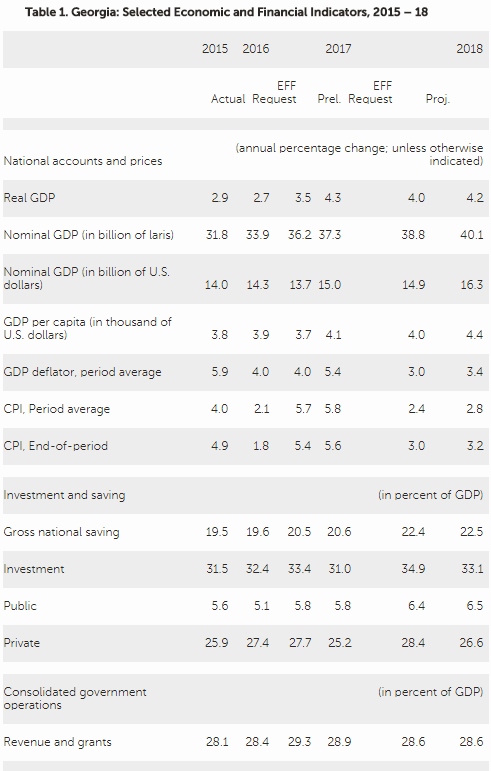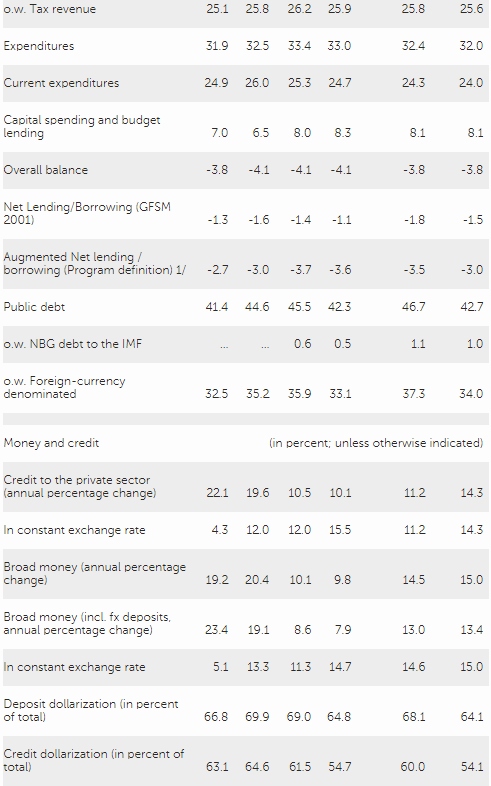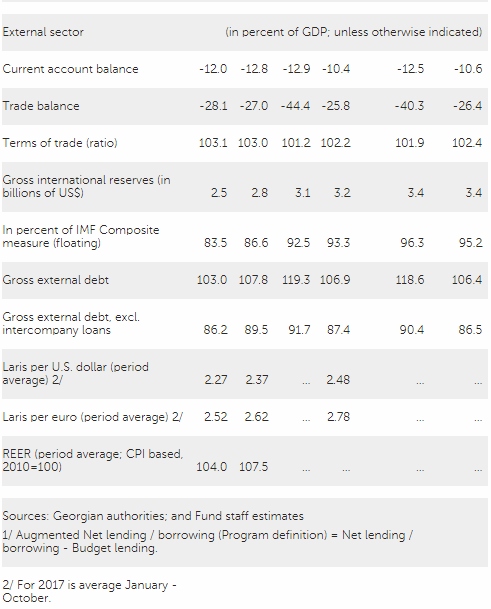MF Executive Board Completes the First Review of the Extended Arrangement under the Extended Fund Facility for Georgia
● The economic recovery is gaining momentum, inflation is projected to decline starting in early 2018, and the external position has strengthened.
● The 2018 budget appropriately targets further fiscal consolidation.
● Continued efforts to advance structural reforms are key to achieving higher and more inclusive growth.
On December 6, the Executive Board of the International Monetary Fund (IMF) completed the First Review of Georgia’s performance under the three-year extended arrangement under the Extended Fund Facility (EFF) on a lapse of time basis. The completion of the review enables the release of SDR 30 million (about $42.4 million), bringing total disbursements under the arrangement to SDR 60 million (about $84.8 million). The extended arrangement for SDR 210.4 million (about $297.5 million or 100 percent of quota) was approved by the Executive Board on April 12, 2017.
The program is on track with all end-June 2017 performance criteria and structural benchmarks met. Economic activity has strengthened on the back of stronger growth in main trading partners. Fiscal overperformance and efforts to address structural weaknesses have helped boost confidence.
Georgia’s economic performance has improved, but risks to the outlook remain. The economic recovery is gaining momentum, inflation is projected to decline starting in early 2018, and the external position has strengthened. Revenue overperformance provides room for additional capital spending and VAT repayments in 2017. The banking sector remains liquid, profitable, and well capitalized. Despite the positive outcomes, the authorities need to remain vigilant and sustain reform efforts to address structural obstacles to growth.
The 2018 budget appropriately targets further fiscal consolidation. The 2018 budget envisages a further decline in the deficit while allowing for an increase in capital spending. To achieve this, efforts to strengthen revenue administration should continue, especially to prevent the buildup of VAT claims. The authorities should also bolster efforts to further contain current spending, for instance, by containing the wage bill, improving the targeting of social programs, and reducing subsidies and equity injections to state-owned enterprises (SOEs).
Medium-term fiscal commitments should be completed as currently envisaged and require progressing with institutional fiscal reforms. Staff welcomes the authorities’ commitment to fiscal consolidation while accelerating high-priority infrastructure investment. A stronger framework for managing public investment will help improve efficiency on the use of public resources. The authorities’ commitment to comprehensively assess and monitor fiscal risks should be clearly reflected in the 2018 Fiscal Risk Statement. Efforts to improve the budgetary processes and fiscal reporting—for instance, by improving the coverage and measurement of fiscal aggregates to reflect activities of legal entities of public law (LEPLs) and SOEs, elaborating on compliance with fiscal rules, and strengthening macroeconomic and fiscal forecasting—will help improve fiscal transparency and accountability.
Monetary policy remains rightly focused on price stability, supported by the flexible exchange rate and efforts to strengthen the transmission mechanism. The NBG’s monetary policy stance is appropriate, but the authorities need to remain vigilant on monetary and financial developments, including related to credit growth. The inflation targeting framework, combined with the floating exchange rate regime, has served Georgia well. Foreign exchange intervention should remain limited to smoothing excessive exchange rate volatility and building reserves. The NBG’s steps to strengthen liquidity management, de-dollarize the economy, and improve communication will help strengthen the monetary framework.
The authorities’ steps to increase the resilience of the financial sector are welcome. Proposed legal amendments would appropriately expand the role of the central bank in regulating and supervising non-banks and credit bureaus, enhance the bank resolution framework, and supervise banks on a consolidated basis. The authorities’ efforts to identify legal amendments to adopt an effective emergency liquidity assistance (ELA) framework are also commendable.
Continued efforts to advance structural reforms are key to achieving higher and more inclusive growth. Upgrading infrastructure and strengthening trade integration will boost growth prospects. The new insolvency law for non-financial corporations and the Business House will help improve the business environment. The pension reform will increase the availability of domestic savings to support investment, as long as contributions are enforced. Improved capital market infrastructure, by facilitating mobilization of funds, will support capital accumulation. To further support growth, Georgia also critically needs to advance on education reform.



Source: International Monetary Fund
- 264 reads
Human Rights
Ringing FOWPAL’s Peace Bell for the World:Nobel Peace Prize Laureates’ Visions and Actions

Protecting the World’s Cultural Diversity for a Sustainable Future

The Peace Bell Resonates at the 27th Eurasian Economic Summit

Declaration of World Day of the Power of Hope Endorsed by People in 158 Nations

Puppet Show I International Friendship Day 2020

